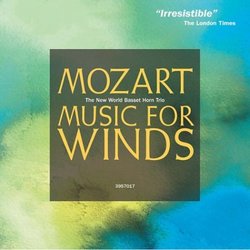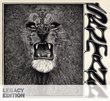| All Artists: Wolfgang Amadeus Mozart, Anton Stadler, New World Basset Horn Trio Title: Mozart: Music for Winds Members Wishing: 0 Total Copies: 0 Label: Hmf Classical Exp. Release Date: 6/8/2004 Album Type: Import Genre: Classical Styles: Chamber Music, Historical Periods, Classical (c.1770-1830) Number of Discs: 1 SwapaCD Credits: 1 UPC: 713746701727 |
Search - Wolfgang Amadeus Mozart, Anton Stadler, New World Basset Horn Trio :: Mozart: Music for Winds
 | Wolfgang Amadeus Mozart, Anton Stadler, New World Basset Horn Trio Mozart: Music for Winds Genre: Classical |
Larger Image |
CD DetailsSimilar CDs |
CD ReviewsFascinating Sanja Kostic | mirro | 11/03/2008 (5 out of 5 stars) "Duos K.487 are written with basset horn in mind, despite that I play these duos on french horn. There are no hunting calls or any of typical horn figures. On the other hand, it is a plethora of all kinds of sewing machine accompaniments and overall it is typical setting for woodwinds. As it is mentioned a first edition comes as for bassoon and two basset horn, instead. My favorites are Divertimentos, even though they glimpse with very simple form. Music is catching on the first glance at Allegro, a diamond in both divertimentos. Buzz, air and clamps are part of imperfect ambience but heavenly music. These three guys make Sisyphus's effort to make these bamboo instruments playing Mozart, and they even make it lovely. I in a way, I fantasize that this is jazz music of 18th century so get the copy and enjoy! Mirro " Accomplished Playing Leslie Richford | Selsingen, Lower Saxony | 07/22/2006 (4 out of 5 stars) "Wolfgang Amadeus Mozart (1756 - 1791) and Anton Stadler (1753 - 1812): Music for Winds. 1. Mozart: Divertimento III K. 439b; 2. Mozart: Divertimento II K. 439b; 3. Mozart: Duos K. 487 (496a). 4. Stadler: 5 Terzetten. Performed by the New World Basset Horn Trio (Lisa Klevit, Erich Hoeprich, William McColl) on period instruments.
Recorded at the Nippon Kan Theatre, Seattle, in March 1989. Originally released as Harmonia Mundi HMU 907017; re-released as HMA 1907017 and as HCX 3957017. Total time: 65'52". If you have never heard a basset horn being played, then it is best described as a somewhat unwieldy, old-fashioned bass clarinet with a wide range, its tone having been decried by later generations as "watery melancholy" (G. B. Shaw). At the end of the 18th century, however, the instrument was very popular, and Mozart included it in a number of his best-known compositions, including of course the "Gran Partita" serenade. He also recognized its possibilities in the area of chamber music, writing both music for two or three basset horns and for one or two basset horns combined with clarinets. The background to many of these pieces is explained in the booklet of Gilles Thome's double CD box "Une soiree chez les Jacquins" (label: ZigZag Territoires, France). Thome's CD avoids monotony by combining the pieces for basset horn and/or clarinet with Mozartean madrigals and rounds and a couple of pieces for fortepiano. The New World Basset Horn Trio, on the other hand, has produced a CD of music purely for basset horn, balancing the "same-ishness" of the musical sound with wonderful timing and beautifully accomplished playing. The five-movement Divertimenti are played with a good deal of refinement, although there could perhaps have been a little more humour, a little more gusto involved. Those who have had the privilege of seeing the New World Basset Horn Trio perform live testify, however, that their concerts are ravishing. The Duos on this CD (five of a collection of twelve) were, it seems, probably composed for the French horn, but they have been traditionally assigned to basset horns, and William McColl points out in his notes that their being played here is an expression of the basset horn players' unwillingness to give them up. They sound fairly simple, with a couple of jolly tunes interrupting some otherwise fairly uneventful music. The five pieces by Stadler are chosen from 18 such that are known. They are compositionally not up to the Mozart level, some being rather banal, but nevertheless they are certainly worth hearing for the use of special effects (drum-like beats) and for the folksy Viennese atmosphere that they convey from a hundred years before Schrammelmusik. This may not be a must-have disc, but anyone who is concerned to get to know the many facets of Mozart or of 18th century chamber music should think about purchasing this CD - at this price there is no risk involved. " |


